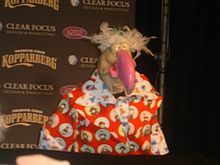May, about mid-May, through early June is honeysuckle sorbet time in Chapel Hill at Crook’s Corner. It was not always so. Bill Smith, head Crook cook, invented honeysuckle sorbet after Crook’s owner Gene Hamer handed him a honeysuckle flower and said “See what you can do with this.” Bill eventually dug up an old, as in Renaissance, Italian cookbook with an Arabian recipe for jasmine ice. After many tweeks, Bill came up with the current recipe, which is in his book Seasoned in the South.
Last year we missed honeysuckle sorbet season and this year we nearly did again. But a business dinner at Crook’s with Obie Greenberg and others reminded me of this short season. Although I was to be out of town in Rhode Island, I was able to alert Sally and Tucker about the sorbet season.
On an otherwise lazy Thursday night, Tucker and Sally were having the frozen seasonal treat at the bar when a too drunken patron tossed a glass at the barkeep — not a standard act at Crook’s to be sure. After that excitement, he was kicked out and later had two more confrontations at other bars and on the street before the police took him in for the night. (see fourth bullet).
But on Saturday when I got back to town, we made it back to Crook’s for some more honeysuckle sorbet. It was an eventless night is a good way. The barkeep had both sugar water and mint on hand and could make a nice julep too.
This past Saturday, I was sure we were at the end of the season. We’d been out looking at honeysuckle and it had about bloomed out in our neighborhood. Sally’s cousin from South Carolina was in town to see UNC whip Coastal Carolina at baseball. It was a perfect Crook’s night. A slow one, but a casual one. Bill still had his great softshell crabs on the menu for one thing. The other is that I ran into him coming from his secret honeysuckle source with a big pitcher full of flowers. Bill was in an unhurried and talkative mood — so that’s where I got all the story of his invention (above).
Bill’s blog, Seasoned in the South, is chocked full of good food stories–and in the last few weeks several on honeysuckle sorbet. Here. Here. Here and Here too.
For the recipe for honeysuckle sorbet, get Bill’s book also called Seasoned in the South or here in Gourmet.









Recent Comments